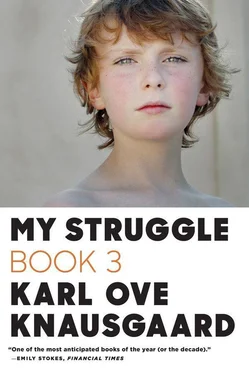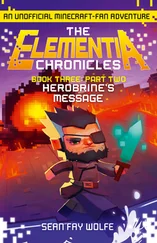“Don’t do that!” she said this time, and ran ahead, away from me. “Don’t be so childish!”
Was she really angry?
Seconds passed. Then she turned and smiled. Briefly, but it was enough, she wasn’t angry, she didn’t think I was childish.
But wasn’t that an Østland accent?
Was she not from here? Was she only visiting?
Then I would never see her again.
No, no, no. Relax. Visitors wouldn’t be allowed in the school procession!
I suddenly noticed the flag I was holding and raised it. Last 17th of May Dad was annoyed I had let the flag droop as I passed them.
Dag Magne beamed his broadest smile. A camera flashed. His parents were in the front row. They were unlike their normal selves, their Sunday best looked strange on them.
I observed the girl again.
She wasn’t very tall and she was wearing a pink jacket, a light-blue skirt, and thin, white stockings. Her nose was small, her mouth large, and she had a little cleft in her chin.
I felt pains in my stomach.
When she spun round to stop her skirt being lifted I had seen that she had big breasts, her jacket had been open and the white sweater beneath insubstantial.
Oh, dear God, please let me go out with her.
“Hi, Karl Ove!” Mom shouted from somewhere. I scanned the rows of people. There they were, on the other side of the street from Hotel Phønix. Mom waved and lifted her camera to her eye, Dad sent me a nod.
On our way back to the center she turned and looked at me again. Straight afterward the procession broke up and she was lost in the crowd.
I didn’t even know her name.
After the school procession in Arendal everyone drove back home to the estate, where clothes were changed, food was eaten, and perhaps also TV broadcasts of the children’s processions around the country were watched before everyone piled into their cars, rather more informally dressed, and headed for Hove, where the climax of the celebrations would take place. Here there were stalls selling hot dogs, ice cream, and pop, stalls where you could buy a lottery ticket and play tombola, organized games, and a huge crowd of children with ten-krone notes burning a hole in their pockets, running here to buy a hot dog, running there to jump in a sack race, with ketchup on their sleeves and ice cream smeared around their mouths and a bottle of Coke with a straw in their hands. We hadn’t quite outgrown that, but the speed with which we did everything had perhaps dropped, compared with the previous year. For my part, I searched for the girl in the procession all afternoon, if I caught sight of a pink jacket or a blue skirt my heart almost stopped beating, but it was never her, she wasn’t there. Even if I knew which class she was in and even if I played soccer with two boys who were in the same class as her, I couldn’t ask them, they would realize straightaway what was going through my mind and wouldn’t hesitate for a moment, they would spread it far and wide. However, sooner or later I would see her again, that much I did know, Tromøya was not that big.
Dad moved home two weeks later, proud to have finished his studies in a matter of months. He had sold his stamp collection, he had given up his political commitments, the garden was immaculate, he was so on top of his teaching it was boring. What he was doing was applying for new jobs. And if he got one, we would move. He hoped the coming year as a bog-standard ungdomskole teacher would be his last.
He bought himself a boat at the beginning of the summer, a Rana Fisk 17 with a twenty-five-horsepower outboard motor. Mom, Yngve, and I were standing on the pontoons when he came back from Arendal for the first time. He was standing behind the wheel as the boat skimmed across the water and although he didn’t smile or wave to us I could see he felt proud.
He eased back on the throttle and the prow of the boat sank, but not enough for him to be able to turn into our berth as he had planned, the boat overshot and bumped into the pontoon. He reversed, put the engine into gear, and glided in. Threw the mooring rope to Mom, who didn’t quite know what to do with it.
“Does it go well?” I said.
“Yes, it certainly does,” he said. “You saw, didn’t you?”
He jumped ashore with a red gasoline canister in his hand. Secured the tarpaulin, stood for a moment inspecting the boat, then we got into the car and drove up toward home, with Dad at the wheel even though it was Mom’s car.
When the school year began I had to join him casting nets in the afternoons and pulling them up at the crack of dawn. We gulped down a couple of pieces of bread, our faces drawn with tiredness, and then we went into the darkness. He started the car and drove down to the pontoons, which lay quiet and deserted, undid the green tarpaulin on the boat, put the red canister of gasoline in its place, loosened the mooring ropes, got the engine going, and carefully reversed out. I sat at the front, behind the windshield, shoulders hunched, arms close to my body, and hands in my pockets because it was cold, and even though the boat was faster than the old double-ender, the trip to the far side of the island still took over half an hour. Dad stood at the wheel concentrating on steering through the narrow passage between the shore and the island of Gjerstadholmen, where there was some sunken rock he had run onto earlier that summer. As we emerged into Tromøya Sound he sat down and we plowed across, with the waves thumping against the underside of the plastic propeller and spray hurtling through the air. He usually set the nets quite close to the shore and it was my job to sit in the bow and grab the floats to which they were attached. It was difficult, they were slippery, and if I didn’t succeed the first time Dad told me to get my act together, all I had to do was pick them up. My hands were already freezing, the water was obviously ice cold, and out here, in open sea, there was always a wind blowing early in the morning. Dad’s hair was in wild disarray, his eyes flashed with annoyance as he reversed and steered into the wind again, and if I didn’t grab the float this time, he would shout at me and I would start to cry, and then he would become even more angry and perhaps stomp forward to grab it himself, while telling me to take the wheel, steer into the fricking wind, he would say, into the wind, I told you, you idiot! Can’t you do anything! Steering’s not so easy, I said, and he replied, it’s not steewing, it’s steering ! RRR. STEERING! I was crying and frozen and Dad leaned over the railing and pulled the float on board. Then, as we rocked on the waves, with the dawn light a stripe on the horizon, and he pulled up the net, the glow of fury in his eyes gradually abated and he would try to mitigate the effect of his outburst, but it was too late, the cold was as deep in my soul as it was in my hands, I hated him as you can only hate your father, and on the way back, with the fish still squirming in the white tub, not a word passed between us. While he gutted the fish in the utility room I packed my satchel and left for the day, which for my classmates had only just begun, but which for me had already lasted several hours.
That same autumn our band finally became a reality. The name I chose won the day, it was to be Blood Clot we wrote on our jackets and satchels, and we practiced in the basement of the new chapel. Dag Magne had arranged it, his mother did the cleaning for a doctor who was also on the church committee. He was also the only one of us who could play or evince anything that was redolent of musical talent. He played the guitar and sang, I played the guitar, Kent Arne played the bass his mother had bought for him, Dag Lothar played the drums. At the end-of-term Christmas party we were lined up to play in the gymnasium. Yngve had taught me the chords for Forelska I Lærer’n, The Kids’ big hit, In Love with the Teacher, and even though playing that song of all songs was like sucking up, at least for me, it was the easiest song Yngve knew, and probably the only song in existence that was simple enough for us to play. Although the band came apart at the seams in the process, everyone played at their own tempo, and Kent Arne started tuning the bass in the middle, and although most of the audience was critical, even the fourth-years ventured a few remarks, and rightly so, we couldn’t play, the feeling among us afterward, standing in the school playground, dressed in ripped jeans and denim jackets, and with scarves around our necks, could not be surpassed. We were in the sixth class, would soon be in the ungdomskole, and we were in a band. The fact that the band split up straight afterward, as neither Dag Lothar nor Kent Arne wanted to continue, was a setback, but Dag Magne and I carried on as a duo, for as long as it lasted, recording songs in his house, listening to music, dreaming of a breakthrough, for example at the locally famous Saga Nights, which would be in Arendal during the summer and at which new bands were allowed to play. I went up to see Håvard, who played in the town’s only punk band, was five years older than us, and lived by Tromøya Bridge, and asked him if he could help us to get in. He couldn’t promise anything, but he would put in a good word and we would have to wait and see.
Читать дальше












